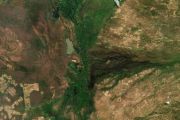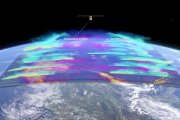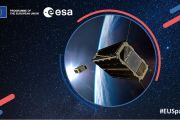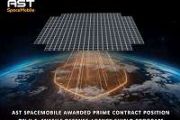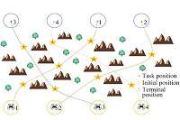
Copernical Team
US Judge denies Musk bid to scrap SEC deal barring him from tweeting about Tesla stake
 Elon Musk on Wednesday lost his legal challenge against a US Securities and Exchange Commission (SEC) order restricting him from tweeting about his stake in the electric car manufacturer Tesla, with a judge describing as "meritless" Musk's argument that the arrangement impinged on his right to free speech.
"The motion [...] to terminate the consent decree is DENIED," Judge Lewis Liman wrot
Elon Musk on Wednesday lost his legal challenge against a US Securities and Exchange Commission (SEC) order restricting him from tweeting about his stake in the electric car manufacturer Tesla, with a judge describing as "meritless" Musk's argument that the arrangement impinged on his right to free speech.
"The motion [...] to terminate the consent decree is DENIED," Judge Lewis Liman wrot DLR provides female measuring mannequins for the NASA Artemis I mission
 In 2022, NASA's Artemis I mission will send a spacecraft capable of supporting a human crew to the Moon for the first time in almost 50 years. On this uncrewed test flight, it will be the twin measuring mannequins Helga and Zohar on board the Orion capsule. The MARE experiment devised by the German Aerospace Center (Deutsches Zentrum fur Luft- und Raumfahrt; DLR), will use two identical 'phantom
In 2022, NASA's Artemis I mission will send a spacecraft capable of supporting a human crew to the Moon for the first time in almost 50 years. On this uncrewed test flight, it will be the twin measuring mannequins Helga and Zohar on board the Orion capsule. The MARE experiment devised by the German Aerospace Center (Deutsches Zentrum fur Luft- und Raumfahrt; DLR), will use two identical 'phantom China opens Shenzhou-13 return capsule
 On Tuesday, China opened the return capsule of the Shenzhou-13 manned spaceship which carried three astronauts back to Earth on April 16, according to the China Manned Space Agency (CMSA).
Items carried by the spacecraft, including crop seeds, 8K high-definition memory card storing images and videos taken by the astronauts in orbit, commemorative stamps, and paintings by Hong Kong teenager
On Tuesday, China opened the return capsule of the Shenzhou-13 manned spaceship which carried three astronauts back to Earth on April 16, according to the China Manned Space Agency (CMSA).
Items carried by the spacecraft, including crop seeds, 8K high-definition memory card storing images and videos taken by the astronauts in orbit, commemorative stamps, and paintings by Hong Kong teenager NASA gives boost to Boston University-led effort to model solar system's protective bubble
 A Boston University-led team that has pioneered major advances in our understanding of the bubble protecting the solar system-and all life on Earth-has won a major new grant from NASA. The SHIELD (Solar wind with Hydrogen Ion Exchange and Large-scale Dynamics) DRIVE Science Center has been awarded a new five-year grant to continue advancing its breakthrough work in heliophysics, the study of how
A Boston University-led team that has pioneered major advances in our understanding of the bubble protecting the solar system-and all life on Earth-has won a major new grant from NASA. The SHIELD (Solar wind with Hydrogen Ion Exchange and Large-scale Dynamics) DRIVE Science Center has been awarded a new five-year grant to continue advancing its breakthrough work in heliophysics, the study of how The instability at the beginning of the solar system
 Michigan State University's Seth Jacobson and colleagues in China and France have unveiled a new theory that could help solve a galactic mystery of how our solar system evolved. Specifically, how did the gas giants - Jupiter, Saturn, Uranus and Neptune - end up where they are, orbiting the sun like they do?
The research also has implications for how terr
Michigan State University's Seth Jacobson and colleagues in China and France have unveiled a new theory that could help solve a galactic mystery of how our solar system evolved. Specifically, how did the gas giants - Jupiter, Saturn, Uranus and Neptune - end up where they are, orbiting the sun like they do?
The research also has implications for how terr Mars Helicopter spots landing rig and chute from Perseverance
 NASA's Ingenuity Mars Helicopter recently surveyed both the parachute that helped the agency's Perseverance rover land on Mars and the cone-shaped backshell that protected the rover in deep space and during its fiery descent toward the Martian surface on Feb. 18, 2021. Engineers with the Mars Sample Return program asked whether Ingenuity could provide this perspective. What resulted were 10 aeri
NASA's Ingenuity Mars Helicopter recently surveyed both the parachute that helped the agency's Perseverance rover land on Mars and the cone-shaped backshell that protected the rover in deep space and during its fiery descent toward the Martian surface on Feb. 18, 2021. Engineers with the Mars Sample Return program asked whether Ingenuity could provide this perspective. What resulted were 10 aeri Campaign #2: The Delta Front
 This week on Mars, Perseverance officially began the "Delta Front Campaign." This second campaign of the mission commenced on April 18th, 2022, the 415th sol since landing. Each campaign represents a sub-portion of the Mars 2020 mission and is dedicated to exploring a distinct region, drilling designated sets of cores for possible future return to Earth, and taking numerous in situ science obser
This week on Mars, Perseverance officially began the "Delta Front Campaign." This second campaign of the mission commenced on April 18th, 2022, the 415th sol since landing. Each campaign represents a sub-portion of the Mars 2020 mission and is dedicated to exploring a distinct region, drilling designated sets of cores for possible future return to Earth, and taking numerous in situ science obser SpaceX launches NASA's Crew-4 to ISS after week-long delay
 NASA and SpaceX launched four astronauts to the International Space Station early Wednesday.
Crew-4 boarded a brand new Crew Dragon capsule and launched on a SpaceX Falcon 9 rocket to the ISS at 3:52 a.m. EDT from launch Pad 39A at Kennedy Space Center in Florida.
NASA astronauts Kjell Lindgren, Bob Hines and Jessica Watkins are joined by European Space Agency astronaut Samantha
NASA and SpaceX launched four astronauts to the International Space Station early Wednesday.
Crew-4 boarded a brand new Crew Dragon capsule and launched on a SpaceX Falcon 9 rocket to the ISS at 3:52 a.m. EDT from launch Pad 39A at Kennedy Space Center in Florida.
NASA astronauts Kjell Lindgren, Bob Hines and Jessica Watkins are joined by European Space Agency astronaut Samantha Canada's first commercial spaceport lists on the NEO Exchange as Maritime Launch Services
 NEO is proud to welcome Maritime Launch Services Inc., a Canadian-owned commercial space company, as they list today on the NEO Exchange. Maritime Launch is now available for trading on NEO under the symbol MAXQ.
Maritime Launch is building a Spaceport in Nova Scotia, which is positioned to become a world-class commercial launch complex. The first of its kind in Canada, Spaceport Nova Scot
NEO is proud to welcome Maritime Launch Services Inc., a Canadian-owned commercial space company, as they list today on the NEO Exchange. Maritime Launch is now available for trading on NEO under the symbol MAXQ.
Maritime Launch is building a Spaceport in Nova Scotia, which is positioned to become a world-class commercial launch complex. The first of its kind in Canada, Spaceport Nova Scot Inmarsat CEO issues warning over space sustainability with 'unmanaged expansion'
 Rajeev Suri, Chief Executive Officer of Inmarsat, the world leader in global, mobile satellite communications, issued a stark warning Wednesday that unmanaged space sector expansion could exacerbate environmental damage, stifle innovation and undermine the long-term capability of satellites to help combat climate change.
Addressing the Royal Aeronautical Society's conference 'Towards a Spa
Rajeev Suri, Chief Executive Officer of Inmarsat, the world leader in global, mobile satellite communications, issued a stark warning Wednesday that unmanaged space sector expansion could exacerbate environmental damage, stifle innovation and undermine the long-term capability of satellites to help combat climate change.
Addressing the Royal Aeronautical Society's conference 'Towards a Spa 

